Equality data 2023
Published 8 March 2024
Applies to England, Scotland and Wales
Section 1: Executive Summary
Introduction
This report demonstrates how the Insolvency Service is meeting its Public Sector Equality Duty under the Equality Act 2010. Monitoring the equality and diversity of our workforce also shows us the effect of our employment policies and processes, which enables us to identify areas where there may be differences between groups and where interventions may be required.
This report covers the period between 01 April 2022 and 31 March 2023. Unless specified to the contrary, the data is as at 31 March of the relevant year.
Headlines
-
It is not a mandatory requirement for employees to provide diversity data. This can result in insufficient information being recorded in some areas to make meaningful analysis.
-
Work continues to encourage employees to complete their diversity information on the HR/Payroll system. This has delivered positive results. The outcomes help inform all our policy changes and help assess business impacts.
-
The representation of women in the Insolvency Service (57.6%) is higher than the Civil Service figure (54.6%).
-
The representation of our employees from ethnic minority backgrounds based on declarations is 19.5%, which has increased from 18.8% in 2022.
-
Our representation of disabled employees is 16.6% as at 31 March 2023, increasing from 15.1% in March 2022.
Our Diversity and Inclusion Strategy Inclusion First has the following aims:
Our Vision
We want to be a great organisation where everyone can feel comfortable, accepted, valued, and supported to be their true self and deliver their best.
Our approach
Our Diversity and Inclusion strategy is Inclusion First which was launched in 2021 and was reviewed following the Civil Service plan published in February 2022 to ensure our action met the wide Civil Service requirements.
Inclusion First
Key areas to deliver our vision
- Culture - Building and thriving in an inclusive environment.
- Representation - Attract, engage and retain individuals from a range of diverse characteristics and socio-economic backgrounds.
- Capability – building capability to meet all changing developments
- Access to our services – accessibility for all.
To help promote and mainstream diversity and equality we also have Diversity Champions who are members of our Executive Leadership Team. Additionally, each one of our employee network groups have been sponsored by a named senior leader.
To widen awareness and governance of Diversity and Inclusion, we have a Diversity Forum which is led by one of our Diversity Champions with business and our network group representation. The Diversity Forum helps to promote diversity and inclusion across the agency and raise awareness and celebration of events, achievements, news, and policy changes across the agency. The forum provides governance, support and guidance for the network groups and assists in clarifying the direction and priorities for diversity and inclusion within the agency. The Diversity Forum proactively supports the Insolvency Service and Civil Service vision to be a brilliant, diverse, and inclusive place to work, by empowering our people to bring their true self to work. The group meets bi-monthly and is tasked with bringing back information to their directorates, leading on/driving actions needed to re-enforce our inclusive culture and sharing best practice.
Section 2: Our Networks
We are also supported by our network groups. We currently have ten network groups:
The Disability Health Network Group - aims to promote understanding of and empathy for the issues faced by disabled colleagues and customers across the agency by positively influencing the attitudes and assumptions of our people.
The FACES network - aims to positively promote ethnicity and race equality within the agency, and to work to ensure individuals within the Black, Asian and Minority Ethnic group are treated fairly and offered equal opportunities.
Mind Matters – aims to provide support and advice for mental health whilst raising awareness and promoting understanding of mental wellbeing for all.
The Women’s Network Group – aims to support each other and share experiences regardless of who we are.
LGBT+ - aims to help colleagues and allies to get together to share experiences and to help to make the Insolvency Service a better place for LGBT+ people.
Part Time Workers network - aims to provide part time workers a forum to share experiences and frustrations in a constructive manner, offer peer support and to look for possible solutions to the issues raised.
Carers Network- supporting carers within the Insolvency Service and supporting workplace changes.
Grass Roots – supporting the environment.
The Shed – our men’s network aims to help create a more diverse, inclusive and equal place to work
No Limits – aims to support equality and fairness for people from a low socio-economic background.
Section 3: Employee Declaration Rates
The employee profile analysis is based on a headcount figure of 1733 as at 31 March 2022 and 1,649 as at 31 March 2023. (All the relevant periods last from 1 April to 31 March), and unless otherwise stated, excludes temporary workers. Any actual figure of 5 and under will be represented by an Asterix (*) to protect individuals from being identified. The Insolvency Service grading system is as follows:
Band A1 - Administrative Assistant
Band A2 - Administrative Officer
Band B1 - Executive Officer
Band B2/B3 - Higher Executive Officer
Band L - Insolvency Examiner
Band C - Senior Executive Officer
Band D - Grades 7 and 6
SCS - Senior Civil Servant
Table1: Employee Head Count
| 2021 | 2021 | 2022 | 2022 | 2023 | 2023 | |
| Grade | People (count) | People (%) | People (count) | People (%) | People (count) | People (%) |
| Band A | 639 | 35.3 | 581 | 33.5 | 486 | 29.5% |
| Band B | 329 | 18.2 | 337 | 19.4 | 328 | 19.9% |
| Band L | 372 | 20.6 | 330 | 19.1 | 332 | 20.1% |
| Band C | 314 | 17.3 | 329 | 19 | 334 | 20.3% |
| Band D | 148 | 8.2 | 144 | 8.3 | 157 | 9.5% |
| SCS | 8 | 0.4 | 12 | 0.7 | 12 | 0.7% |
| Total | 1810 | 100% | 1733 | 100% | 1649 | 100.0% |
In some areas, the declaration response is low, but the rates have been increasing due to repeated activity aimed at encouraging people to declare their diversity details (see Table 2). It is not mandatory for employees to complete this information.
Table 2
| Equality Strand | % Declaration Rate 31/03/21 | % Declaration Rate 31/03/22 | % Declaration Rate 31/03/23 |
| Sex | 100% | 100% | 100% |
| Age | 100% | 100% | 100% |
| Race | 65.4% | 69.6% | 73.07% |
| Disability | 71.5% | 74% | 74.95% |
| Religion and Belief | 59.9% | 64.5% | 67.98% |
| Sexual Orientation | 56.1% | 61.2% | 64.83% |
Section 4: Overall Employee Equality Data
4.1 Sex:
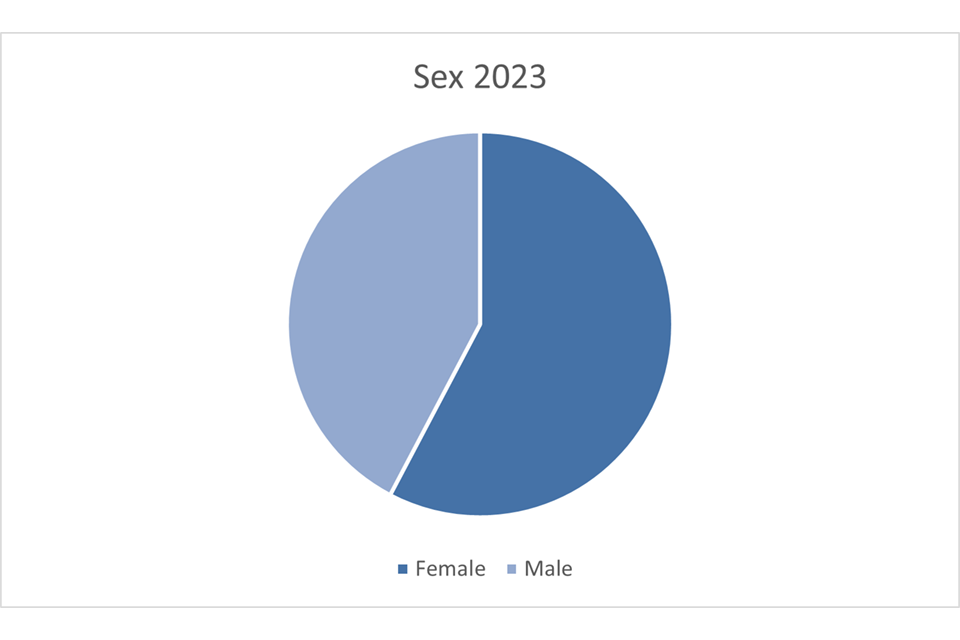
As of 31 March 2023, 57.6% of our employees are women compared to 57.4% at 31 March 2022. In the Civil Service overall, 54.6% of employees are women in 2023, up slightly from 54.5% in 2022.
4.2 Age:
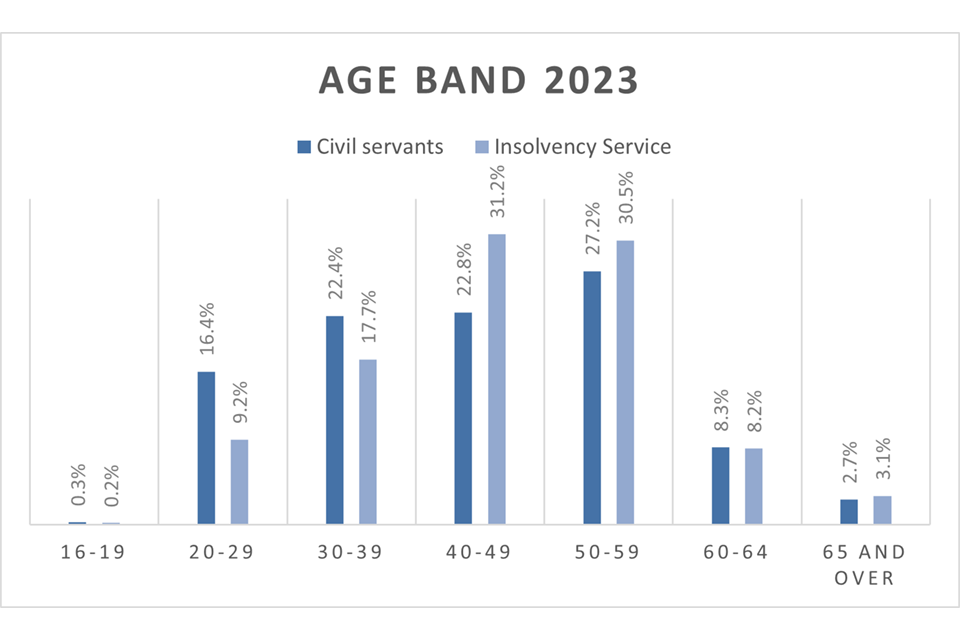
In the year ending 31 March 2023, the Insolvency Service is reflective of the wider Civil Service for those aged up to 19 and over 60. The agency has a greater representation at ages 40 to 59 and the wider Civil Service has so at ages 20 to 39.
4.3 Race/Ethnicity:
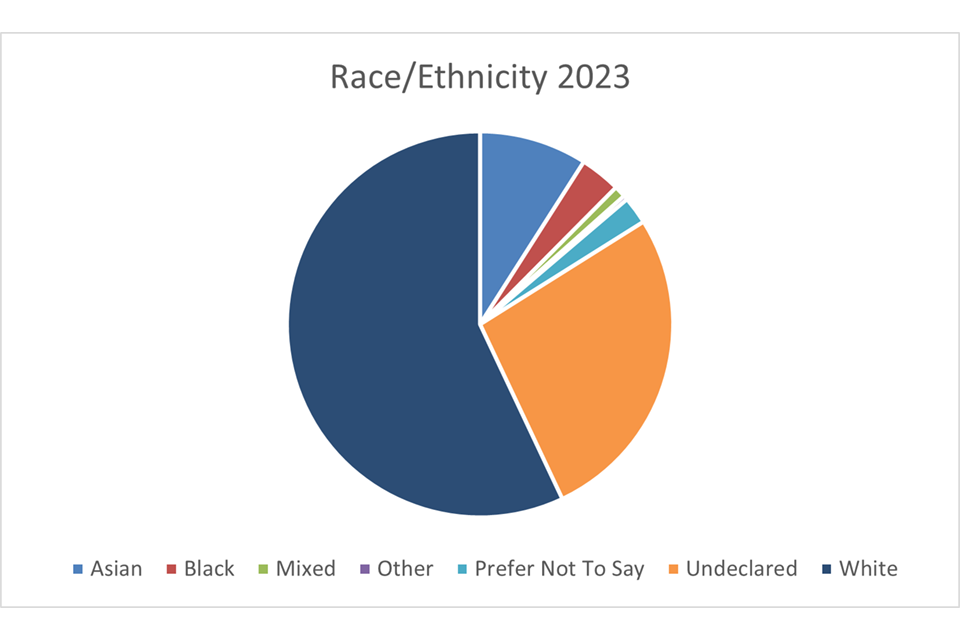
Based upon those who have reported their race/ethnicity in 2023, 19.5% are from an ethnic minority background, which has slightly increased from 18.8% last year. This is higher than the wider Civil Service, where 15.4% are from an ethnic minority from those who reported their race/ethnicity in 2023.
4.4 Disability:
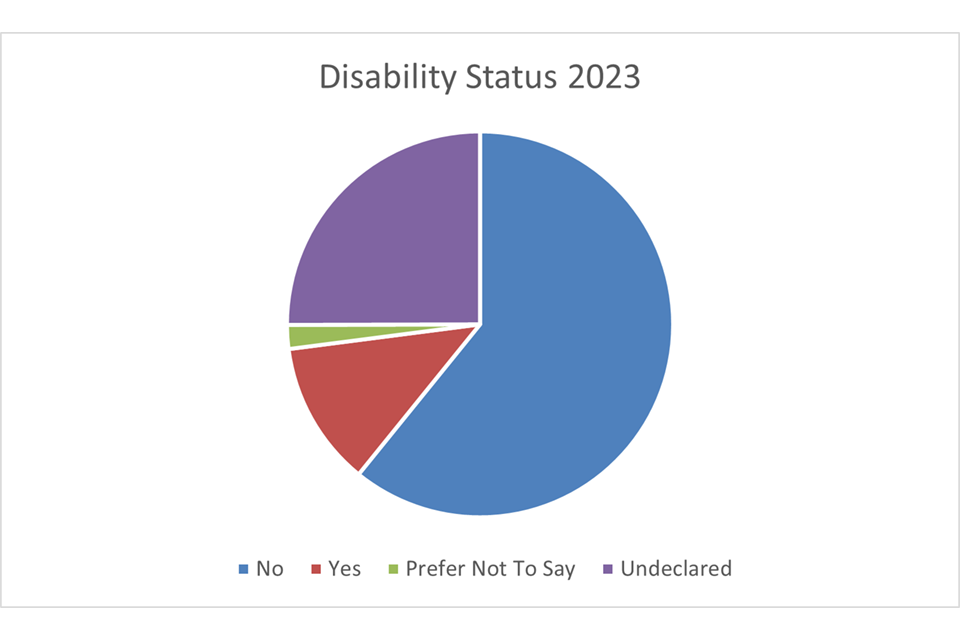
Where disability status is known, the proportion of employees who classified themselves as having a disability or long-term health condition has increased to 16.6% as at 31 March 2023 compared to 15.1% as at 31 March 2022. The Civil Service disability rate as at 31 March 2023 is 15.8%.
4.5 Religion and Belief:
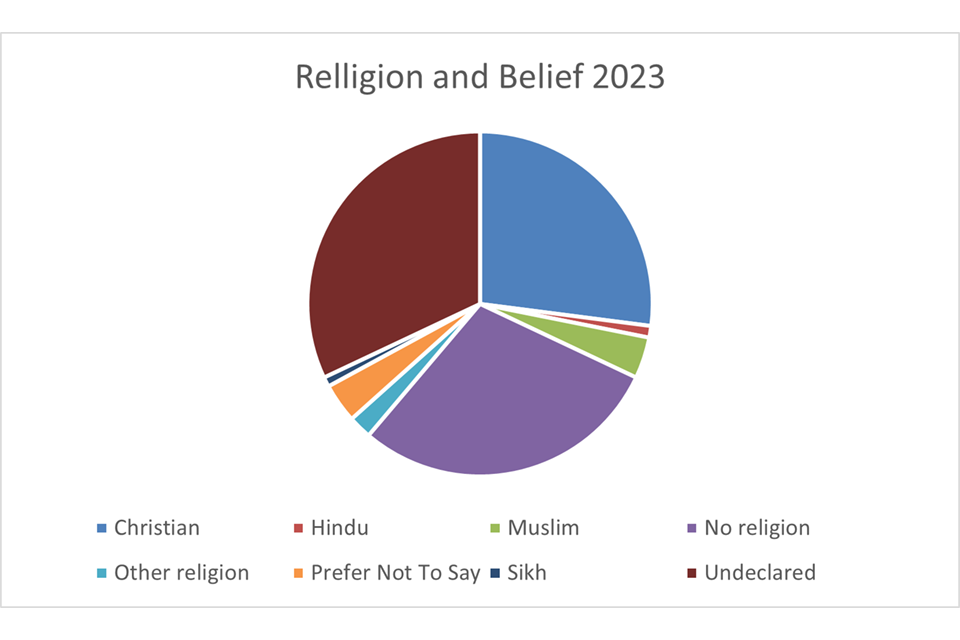
Where religion and belief is known, 45.4% reported having no religion or belief in the Insolvency Service, compared to 42.4% in the wider Civil Service. The most commonly reported religion or belief is Christianity at 42.1% in the Insolvency Service and 44.3% in the wider Civil Service. The second most commonly reported is Islam (Muslim) at 6.0% in the Insolvency Service and 5% in the wider Civil Service.
4.6 Sexual Orientation:
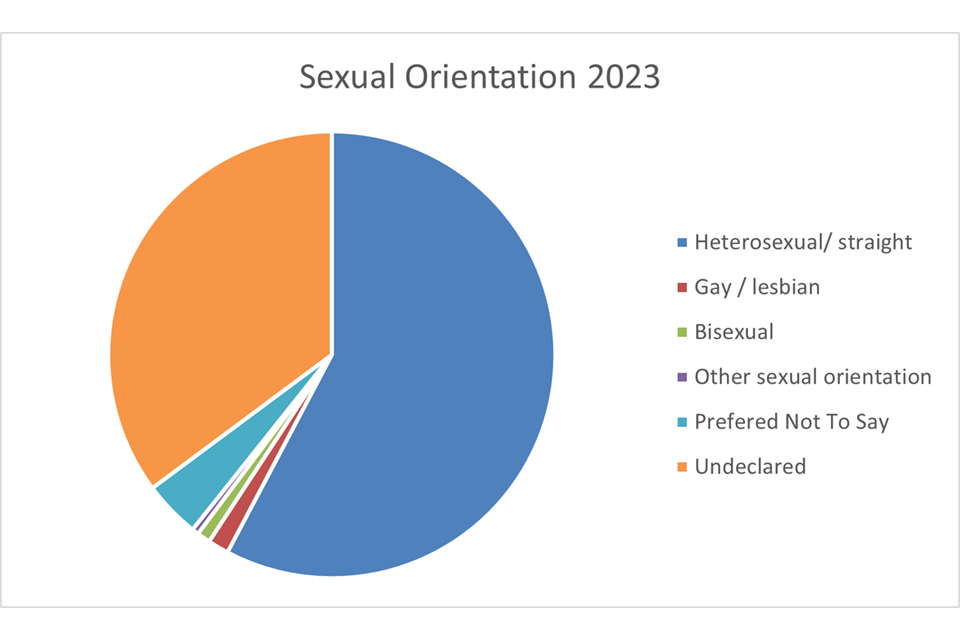
Of those with a known sexual orientation, 4.9 of Insolvency Service employees identify as being lesbian, gay, bisexual or recorded their sexual orientation as ‘other’ (LGBO) as at 31 March 2023, compared with 6.4% of wider Civil Servants.
4.7 Gender Re-assignment:
The agency is part of the Civil Service, and we will be making best use of resources for employees in government departments and agencies who have changed or need to change permanently their perceived sex (transsexual/transgender), or who identify as intersex. The Insolvency Service monitors employees who have changed their assigned sex from the one assigned at birth. Presently, there is no analysis in this area due to low recording rates.
4.8 Pregnancy, Maternity and Paternity:
The Insolvency Service is committed to ensuring that employees can access the full range of benefits available in connection with pregnancy, maternity, shared parental and adoption which in turn will enable employees and skills to be retained. To achieve this, the Insolvency Service has a range of policies and practices in place.
Section 5: Learning and Development
The Insolvency Service considers the development of its employees as a key part of our talent strategy and provides a range of centrally managed learning and development opportunities for all its employees. Some of these opportunities are specifically targeted towards those with protected characteristics under the Equality Act 2010 or where a particular group is currently under-represented in our workforce. Others may be less targeted but nevertheless aid development and retention of these groups.
All employees have access to Civil Service Learning which contains e-learning and direct face to face learning opportunities on several learning and development opportunities.
Records of local training are not held centrally and therefore it would involve disproportionate costs to undertake a diversity analysis of those who have undertaken training. Further consideration will be given to how this information could be captured
HR Business Partners have also delivered and helped facilitate training for the directorates they represent.
Section 6 Working Pattern:
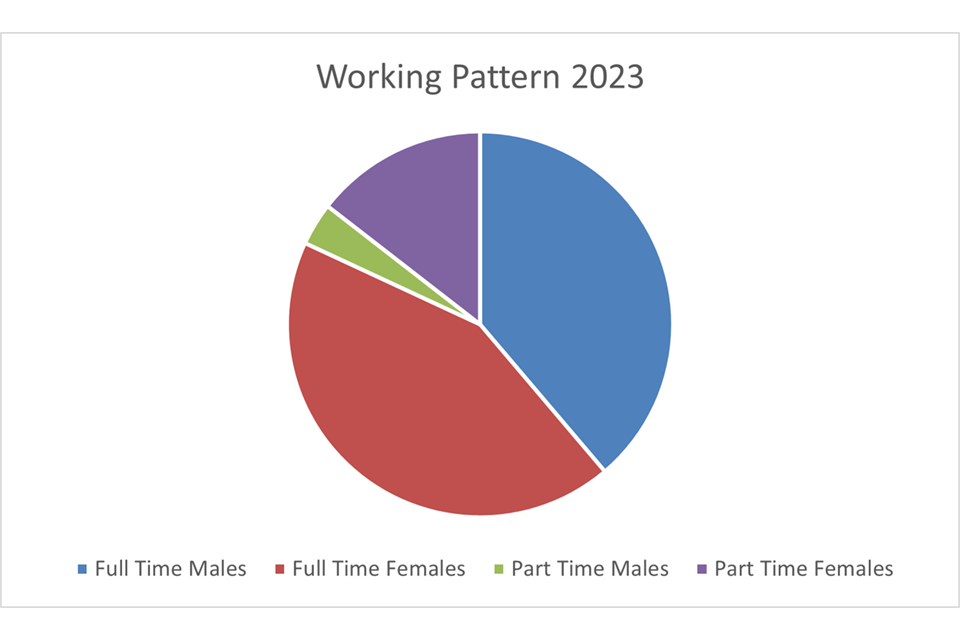
The Insolvency Service encourages managers to accommodate a variety of working patterns which includes part-time employment.
The number of part-time employees in the agency as of 31 March 2023 is 18.1%, an increase from last year (17.5%). 80.2% of part time employees are women which is an increase from last year (79.3%). In comparison, 19.6% of civil servants work part-time, which is down slightly from 20.0% in 2022.
6.1 Flexible working:
The Insolvency Service recognises the benefits of flexible working in helping it attract and retain a talented and diverse workforce. After Covid the minimum expectation of office attendance was reintroduced. This also helps employees to balance other priorities e.g., caring responsibilities for a better work-life balance.
The Insolvency Service operates several flexible working patterns:
- Flex working, where an employee works part of their working week in the office and part at home.
- Remote working, where an employee works from an office that is not their normal base.
- Flexi time
- Compressed hours
- Staggered working hours
- Job Sharing
Section 7: Discrimination, harassment and bullying:
The Insolvency Service employees take part annually in the Civil Service People Survey, in which they are asked if they have been discriminated against, or experienced bullying or harassment at work. In the 2022 survey, 85% of employees stated that they had not experienced discrimination. However, 6% of employees stated that they had experienced discrimination and 8% preferred not to say.
Incidents of perceived bullying and harassment have been largely consistent over the previous three years. In the 2022 survey 88% of employees stated that they were not subject to bullying and harassment, but 7% stated they felt they had been bullied and harassed and 5% preferred not to say.
We continue to look forward to put in place or further embed a number of initiatives aimed at reducing the levels of perceived discrimination, bullying and harassment. Some of the initiatives planned and recent introductions include:
- Behavioural and cultural change that focuses on respect and the ways we can better support those employees who feel that they are subject to bullying and harassment.
- Creating a speak up culture
- An increased emphasis on dispute resolution and the use of mediation.
- Our Wellbeing strategy
- Launching new Agency Values in 2023
We also promote initiative throughout the year, including Pride Month, National Inclusion week, Black History Month and Speak up week.
Section 8: Methodology:
This report shows the demographics of the Insolvency Service’s workforce as of 31 March 2023 and utilises monitoring data from the year ended 31 March 2023 to assess the fairness of employment processes. Where comparisons are made to Civil Service data the figures are from 31 March 2023. Employees included in the analysis includes all paid permanent and fixed term employees but not agency workers or consultants.
The monitoring data is extracted from the Insolvency Service’s internal records and the dashboard designed by the Analysis & Insight team at Cabinet Office using the 2023 Annual Civil Service Employment Survey (ACSES) data on behalf of the Insolvency Service. With regards to employees, the data is as recorded on our HR/Payroll system. Employees are responsible for completing and updating their own diversity information online.
Where appropriate, the agency’s diversity information has been compared to Civil Service data as of 31 March 2023.
